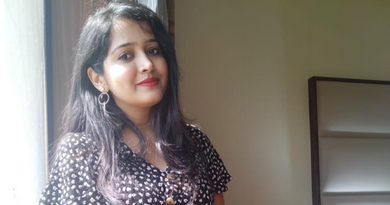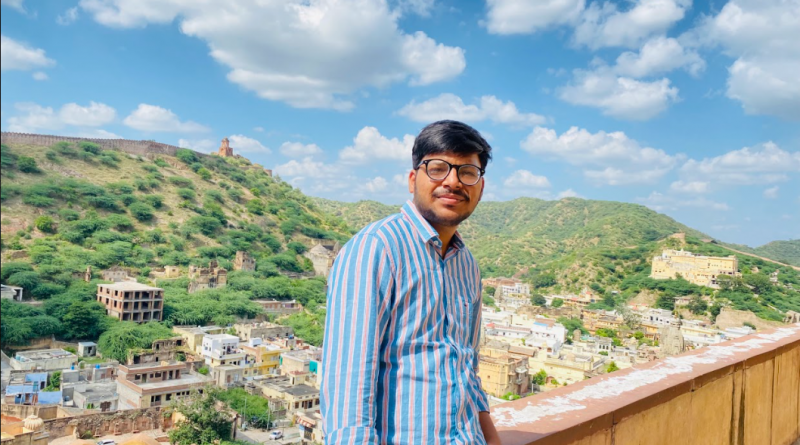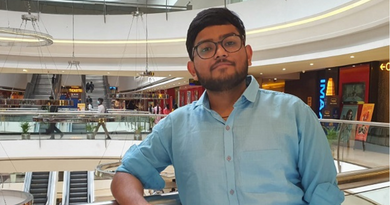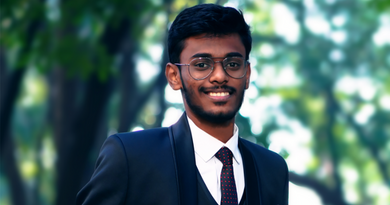Summer Internship at CBM International Organization – Vivek Kumar Yadav from University of Delhi
 Vivek Kumar Yadav interned at CBM International Organization and shares his unique experience of working for the disabled. Vivek is a student at University of Delhi. Read on to explore more about the motivating experience of his life.
Vivek Kumar Yadav interned at CBM International Organization and shares his unique experience of working for the disabled. Vivek is a student at University of Delhi. Read on to explore more about the motivating experience of his life.
One of my favorite teachers, Mr. Abhishek Thakur announced an internship opportunity with CBM International Organization that works for the development and rehabilitation of the disabled people. We, five students from Delhi School of Social Work, University of Delhi, applied for the internship and all of us were selected for it but finally, only three students joined. Our department teacher briefed us about the details (stipend, travel allowance, accommodation, food arrangements etc.). We were placed in different organizations in India, which were funded by CBM. We had presumed that we would be working together and so, we could enjoy as well. But selection was totally different. In the evening, I received a mail from CBM which clarified the misunderstanding.
I had to go alone and was placed at Grameen Abyudya Sewa Samasthe, Bangalore, District- Karnataka. I was unsure about my work place because I had never visited South India and I was worried about food and language. I am from Jaunpur, Uttar Pradesh where Hindi and Awadhi are the most spoken languages and I am not very fluent in English. So how I would manage in Karnataka was a big question. My friends refused to continue with their internship after they were intimated about their organization because they were sure they would not be able to manage and they advised me the same. But I was excited to go out of Delhi and so, I decided to go for the internship to Karnataka.
After finishing my exams, the very next day I left from Delhi for Karnataka. In the train, I was imagining how I would ask someone about my organization if I am not able to locate it, if I will be able to adjust and like the place as well as people. I reported to my agency on 26th May 2014, one day before the start date of my internship. I met Mr. Basavraj Naik, who was the only person there, who could speak and understand basic Hindi language. He took me to the guest house of the organization, which was very nice. But there was a problem- no one used to stay at night in the agency. I lived alone and used to watch television out of boredom. On the TV, most of time I watched Kannada channels to learn the language and Bhojpuri channels to feel that I am in my native area. It was very helpful.
The next day, Mr. Basavraj Naik introduced me to the organization and members of the organization along with their respective posts at the agency. I was very happy to meet them and they also seemed to be very happy when I told that I was from University of Delhi. They asked about my native place. I told but they were not aware about my district, and on telling that it is near Varanasi, the response came was “Oh! Modi area”. I also met Mr. Namdev who was blind and he was a very nice person. Every day, he was full of enthusiasm, even at the age of sixty. I myself have a disability but I never felt it because of my family members. They never considered me as a disabled. But at the organization, I realized that I am a person with disability and I should accept it.
I was given a training program on use of brail and sign language. I came to know about community based rehabilitation also, through the activity. During the training, most of the time, discussion was done in Kannada and my agency supervisor, Ms. Amali was very worried about me understanding it. She requested everyone to brief me about the discussion in either Hindi or English. I was very happy to see that everyone used to speak in Hindi or English with me. Those who did not know either of the languages, talked to me in sign language. I felt very emotional and motivated that in a country like India, we always fight for language status. But for a deaf or dumb person, language does not matter. If we talk heart-to-heart, there are no barriers, there is only one voice- the voice of love which comes through the feelings.
For me, it is difficult to understand how deaf people enjoy their life. I feel bad that why they are not able to listen the voice of others, why they cannot sing a song, why a blind person considers himself as the burden on family and society, why they cannot see the sky and beautiful nature. All these questions make me sensitive about the people with disabilities.
I visited Swadhara Hostel for children with disability, where I found an interesting thing which has been translated by Mr. Basavraj from Kannada to Hindi. There were six disabled children, one of them was blind and asked others “Have you seen Taj Mahal”, to which others replied “No”, and then he said “Taj Mahal is white in color”, and other children asked to him how he knew it. He said “When I was not blind, at my house, there was white stone, my father told me that Taj Mahal is made of that stone.” and they started laughing and playing. My eyes were full of tears. In professional social work course, there is a principle- ‘no emotional attachment with client’ but I was not able to control my emotions. I came back to my room and asked many question from myself as being disabled, what I have done for another person with disability.
Ms. Amali assigned me to do research on ‘women with disability’ and I was very happy with this topic because earlier, I had expressed my wish to work with women. I visited nearly 35 villages in two districts of Karnataka (Bangalore- Rural and Chikkaballapura) for my study. I completed 40 questionnaires with the help of CBR workers and women with disability. It was totally a new experience for me as I got opportunity to know about the culture and family structure in Karnataka. I interacted with forty women with disability. In India, the condition of women is already very bad and suppose if she is suffering with a disability, she is supposed to belong to lower caste and then we can imagine what kind of problem she would be facing in her day-to-day life. During my study, I found there was a village Alipur, with a population of about 80,000 and 90 percent of which belong to Muslim community. The village has 20% disability, but they did not allow someone for treatment. For me, there was a good thing as they were speaking in Hindi (only Muslims) and I interacted with many women. I received blessings from women with disabilities and other people. They said “You are a very nice person, you came from Delhi to know about us. Otherwise, in the present time, no one cares for a disabled person. I was speechless and every time I heard this, I used to smile.
Women with disabilities are one of the most vulnerable and neglected group in the present society. Women with disabilities in India face various discriminations due to dominance of established gender and caste position. My study explored the conditions of disabled women in rural Karnataka. It also described the community and family perception towards disabled women in social, economical, and political terms. On one hand, disability creates limitations for practicing social duties and responsibilities and on the other hand, there are many social structures present to create problems for women, like; structure of family, kingship, caste and community. Women with disabilities are discriminated against socially marginalized and do not have access to basic social services. It is considered that women with disabilities are citizens of equal rights but in reality, the situation is very different. Being a disabled woman, they do not have access to better education or find a suitable job. The community thinks that she cannot be a “good wife” or a “good mother”. This is because of the prejudice of the community. I found that women with disability have limited resources to access education and employment. The involvement of women with disability in family decision-making and social gatherings depends on nature of disability.
After finishing my study, I showed a presentation in my organization and my agency supervisor appreciated my work. Before returning, I meet with every person of the organization and they wished for my bright future and I also received certificate, stipend and a handmade gift from disabled children of the organization. They all looked sad. There was one employee of organization Ms. Laxmimamma. She was a fifty-year old lady and very sharp minded. She called me near her and said “You are the first person who came from out of Karnataka and spent fifty days with us. God bless you!”
The internship was full of experiences for me; I learnt many things about disability, and also about people, culture and language of Karnataka. I also got opportunity to visit the village of Bharat Ratna Award Winner, Sir Mokshagundam Visvesvaraya and Nandi hills. There are no people having disability, it is our mindset of society which makes someone disabled. Here, I want to write one of the famous lines from the novel of Munshi Premchand, in Hindi: In India, the blind do not need a name or work. Their name is Surdas and their profession is begging. This is still practicing in our society, which was written by the writer years ago. Now we have to change it.
I have decided that I will work for people with disabilities and I have chosen disability paper in my second year course for my specialization and interest area.
Acknowledging the contributions: first of all, I would like to thank Ms. Amali, (Director of GASS NGO) for involving me in the projects. Without your initiative and support, the accomplishment of my project would not have been possible. Her guidance and advice have given me the directions as how to go forward with the project. Secondly, I am highly indebted to CBM Organization and its members for selecting me for the internship. Thirdly, I would like to express my gratitude to GASS NGO and all its members for helping me in providing information and guide books which I have incorporated in my project. I am also very great full to the villagers, especially, disabled persons and their parents, family members, and all the people of the concerned areas for their cooperation. They played a big role in this accomplishment. Last but not the least, my sincere thanks goes to Shivmohan and Prateek Chakravoty Sir for providing me valuable study material on disability and resources during my internship. Overall, the block placement was a learning experience with exposure to the ground realities and the actually existing social structures.
FYI! You can view the latest Internships in Bangalore here.
Editor’s note- Have you got an internship story to share? A chance to win cool Internshala T and other cash prizes by sharing your internship story here.



